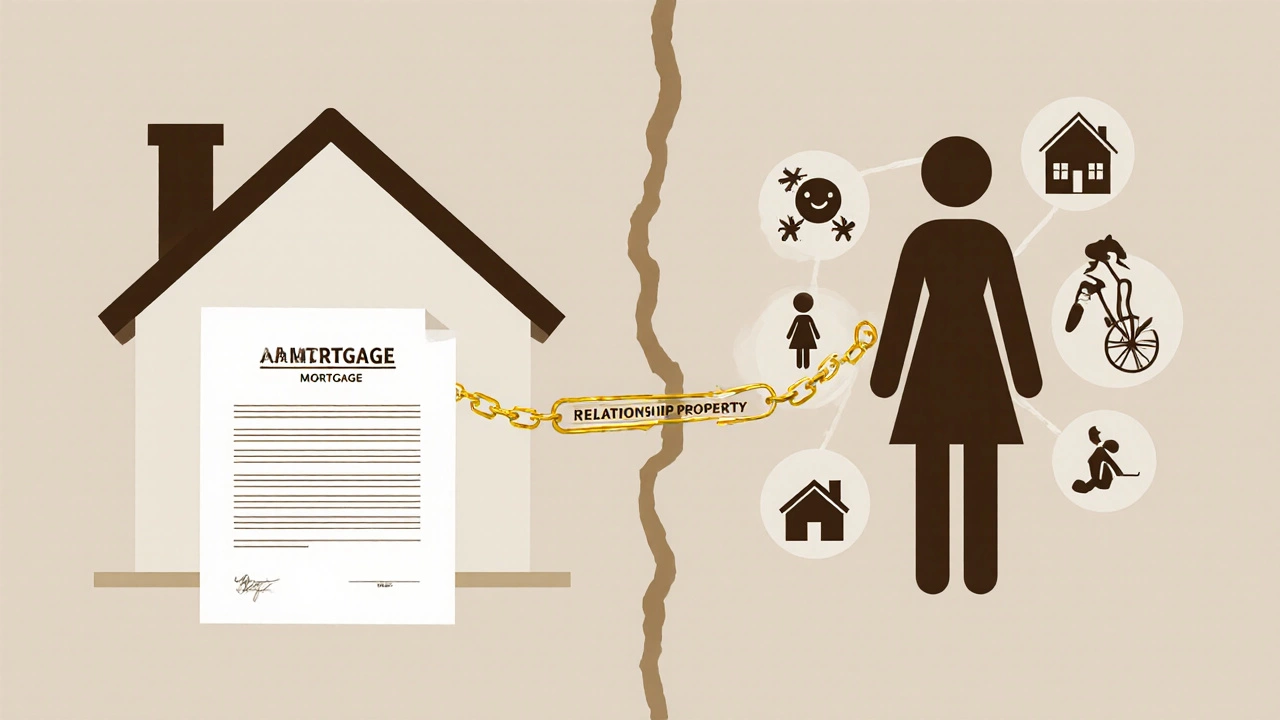New Zealand Property Division Calculator
Calculate Your Potential Share
Many married men in New Zealand wonder if they can buy a house without their wife’s name on the title. The short answer? Yes - but it’s not as simple as just signing a contract. How you own the property, where you live, and how you pay for it all affect your legal rights and your spouse’s claims - even if they’re not on the deed.
Ownership Doesn’t Always Mean Name on the Title
In New Zealand, property bought during marriage is usually considered relationship property under the Property (Relationships) Act 1976. That means even if only one spouse buys the house and puts their name on the title, the other spouse still has a legal claim to half its value if the relationship ends. This applies whether you’re married, in a civil union, or have lived together for more than three years.So, if you buy a house alone during your marriage, your wife doesn’t need to sign anything to become a legal owner - the law already gives her rights. The title might say your name only, but the value of the house is still split 50/50 in a separation. This isn’t about fairness - it’s about how the law defines relationships.
What Happens When You Buy Alone?
Let’s say you’re a married man with a good income, and your wife stays home with the kids or works part-time. You save up a 20% deposit, get pre-approved for a $700,000 mortgage, and buy a house in your name only. You think you’re protecting your assets. But here’s what you’re really doing:- Using income earned during the marriage to pay the mortgage - that’s relationship property
- Building equity in a home that’s legally shared, even if only one name is on the title
- Creating a situation where your wife could claim half the house’s value if you separate, regardless of who paid for it
Some people try to avoid this by using inheritance money or savings from before marriage as the deposit. That’s fine - but you have to prove it. If you mix $100,000 from your pre-marriage savings with $50,000 from your joint account to pay the deposit, the whole amount becomes relationship property. Courts don’t guess - they trace. Keep clear records.
Can You Exclude Your Spouse With a Contract?
Yes - but only if you both sign a contracting out agreement under the Property (Relationships) Act. This is a legally binding document, usually drawn up by a lawyer, that says what happens to property if the relationship ends. It can say that a house you buy alone stays yours, even if it’s bought during the marriage.But here’s the catch: your wife has to agree to it - and she needs independent legal advice. You can’t pressure her. If she signs under stress, or without understanding what she’s giving up, the court can throw it out. These agreements are common among people with businesses, inheritances, or complex assets - but they’re not for everyone.
Many couples skip this step because it feels uncomfortable. But think of it like car insurance: you hope you never need it, but you’re glad it’s there if things go wrong.
What About the Mortgage?
Banks don’t care about relationship property laws - they care about risk. If you’re applying for a mortgage alone, the lender will look at your income, credit score, and debts. They won’t ask about your wife’s income unless she’s on the loan.But here’s the problem: if your wife has a poor credit history, or high debts, the bank might still ask for her to sign a consent form. Why? Because if you die or default, the bank can go after the house - and if she lives there, they need her permission to sell it. This isn’t about ownership - it’s about access.
Some lenders will require your spouse to sign a “non-occupier consent” form, even if they’re not on the loan. This doesn’t make them liable for repayments - it just lets the bank take possession of the house if you can’t pay. It’s a formality, but it’s common.

What If You’re Separated but Not Divorced?
Separation doesn’t automatically end relationship property rights. Even if you’re living apart, any property bought before the final separation date is still shared. The key date is when you both stopped living together as a couple - not when you file paperwork.If you buy a house after separation, but before the legal division of assets, your ex could still claim a share. That’s why many people wait until they’ve signed a formal separation agreement or court order before buying new property.
One real case from Auckland: a man bought a $900,000 house six months after moving out. His wife hadn’t signed any agreement. When they went to court, she got half the equity - even though she hadn’t contributed a cent. The judge ruled: “The property was acquired during the relationship’s ongoing legal status.”
Is It a Good Idea to Buy Alone?
There are valid reasons to buy a house without your wife’s name on the title:- You have significant pre-marriage savings you want to protect
- Your spouse has bad credit or high debt that would hurt your loan approval
- You’re buying as an investment and want to keep it separate
But there are big risks too:
- Your wife can claim half the house if you split up - even if she never paid a mortgage payment
- You can’t sell or refinance without her consent if she lives there
- It can create distrust or resentment if she feels excluded
Most financial advisors in New Zealand recommend joint ownership for married couples - not because it’s legally required, but because it’s simpler, fairer, and reduces future conflict. If you’re buying together, you both get tax benefits, shared responsibility, and clearer rights.
What If You’re Not Married but Living Together?
The same rules apply if you’ve been living together for more than three years. New Zealand law treats de facto relationships the same as marriages when it comes to property. So if you’ve been with your partner for four years and buy a house alone, they still have a claim to half the equity.Shorter relationships (under three years) are different. If you’ve been together for two years and buy a house, your partner generally can’t claim ownership unless they contributed directly - like paying the deposit or doing major renovations. But even then, they could argue for a share based on unfair enrichment. Courts look at fairness, not just paperwork.

What Should You Do?
If you’re thinking about buying a house alone while married:- Get legal advice before signing anything. A lawyer who specializes in relationship property can explain your risks.
- Keep all financial records clear - bank statements, inheritance papers, pre-marriage savings.
- Consider a contracting out agreement if you want to protect your assets.
- Don’t assume silence means consent - your spouse’s rights exist whether they know it or not.
- Talk openly with your wife. Hiding a purchase often leads to bigger problems than the purchase itself.
Buying a house is one of the biggest financial decisions you’ll make. It’s not just about the mortgage - it’s about trust, law, and what happens if things change. Don’t let paperwork blind you to the bigger picture.
Common Myths About Buying Alone
- Myth: “If only my name is on the title, it’s mine.” Truth: The law says it’s shared if bought during marriage.
- Myth: “My wife didn’t pay anything, so she can’t claim it.” Truth: Stay-at-home parenting, childcare, and emotional support count as contributions under NZ law.
- Myth: “We’re separated, so I’m safe.” Truth: Separation doesn’t end relationship property rights - legal division does.
- Myth: “I’ll just use my inheritance.” Truth: Mix it with joint funds, and it becomes shared.
Can my wife stop me from buying a house alone?
No, she can’t legally block you from signing a purchase agreement. But if you’re married, she’ll still have a legal claim to half the value of the house under the Property (Relationships) Act 1976. She can’t stop you from buying, but she can claim her share later if you separate.
Do I need my wife’s permission to get a mortgage alone?
Not for the loan approval - banks only need your income and credit. But if she lives in the house, most lenders will ask her to sign a non-occupier consent form. This doesn’t make her responsible for payments, but it lets the bank sell the property if you default. It’s standard practice, not a legal requirement.
What if I use money I had before marriage to buy the house?
Pre-marriage money is usually separate property - but only if you keep it separate. If you deposit it into a joint account, or use it to pay a mortgage that’s shared, it becomes relationship property. To protect it, keep it in a separate account with clear records showing it came from before the marriage.
Can I buy a house in my name only if we’re separated?
You can, but your ex may still claim a share if the separation hasn’t been legally finalized. The law considers property bought before the official end of the relationship as relationship property. Wait until you have a signed separation agreement or court order before buying new property.
Is it better to buy jointly or separately?
For most married couples, buying jointly is simpler and avoids future conflict. It’s fairer, easier to manage, and reduces legal risk. Buying alone only makes sense if you have strong reasons to protect assets - and even then, you need a lawyer and clear agreements. Most people regret trying to keep property separate - it often causes more stress than it prevents.
